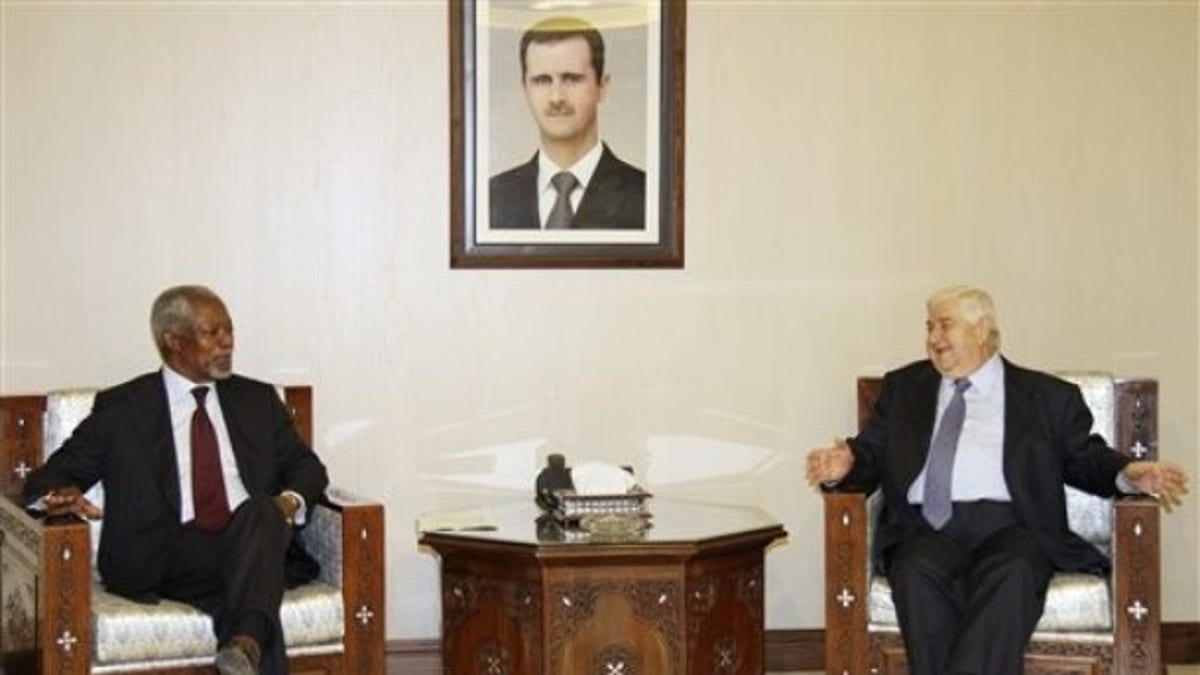
May 28, 2012: UN-Arab League Joint Special Envoy for Syria (JSE) Kofi Annan, left, meets with Syrian Foreign Minister Walid Moallem, right, in Damascus, Syria. (AP)
The question of US intervention in Syria became more urgent over the weekend in light of the apparently execution style murders of more than 100 people, as many as 40 of them children. How could it be otherwise, especially after one has seen the images of the tiny bodies wrapped for burial or worse, the images of those same bodies absent the wrappings, in all of their graphic clarity?
Unless one’s heart is made of stone, the sense that “we must do something, and do it now” is unavoidable. In fact, the sense that now may be a time for US military intervention was voiced by Chairman of the Joint Chiefs of Staff Gen. Martin Dempsey who told Congress that escalating atrocities in Syria could trigger a military response.
Going even further, Arizona Sen. John McCain, referring to lack of US military involvement, called this “a shameful moment in US history…an abdication of everything America stands for and believes in.”
While I share Senator McCain’s sense of moral outrage about current events in Syria, I wonder about the “shamefulness” of our (in)actions and the supposed betrayal of our national values.
Were America to spend blood and treasure in Syria, what would be the result? Even were we successful in deposing Bashar Assad, would he be replaced by a less repressive regime or simply one which practiced the same governance style, albeit with a new set of victims?
As the conflict in Syria is fueled as much by competing understandings of Islam, Sunni vs. Shia, as it is about anything else, there is little reason to assume that the side we would presumably be helping would, when in power, be any more in line with the American values which demanded, in McCain’s view, that we support them to begin with.
There is no doubt that what is transpiring in Syria today is not only heartbreaking, but repugnant. And there is no doubt that if the United States could truly help, we should. But as General Dempsey went on to tell Congress, “There is no template.”
"You'll always find military leaders to be somewhat cautious about the use of force, because we're never entirely sure what comes out on the other side," General Dempsey said. And that is the real lesson in all this.
Moral outrage is actually a relatively cheap and easy emotion, even when it is entirely sincere as I have no doubt it is when expressed by Sen. McCain. But the ethical searching and uncertainty that is known to any wise warrior who must not only stir his audience but wield deadly force and put his own people in harm’s way – that is the voice that needs to guide the current debate.
We should heed no call to arms that ignores that price. Precisely because we are a good and decent people, our sense of moral outrage is relatively easy to provoke. It’s something about which we, as a nation, should be proud. But it is also something about which we must be careful.
The United States is the most powerful nation in the world, and also one of the most moral, but the exercise of our power, our moral conscience or both, comes at a very dear price – one which needs to be fully acknowledged before any action is taken.
Perhaps the time has come for greater military intervention in Syria, but not without a clear sense of what could be realistically achieved, and what the potential costs really are.
Neither the map of those outcomes, nor the costs necessitated by their achievement, has been demonstrated. Until they are, we have no business entering the conflict in Syria. If and when they are, it will be time to revisit the question, but not until then.
Sen. McCain invoked Memorial Day as the appropriate time to get more involved in Syria. But one could just as easily invoke it as a reason to say out.
The first argument remembers the causes for which those fallen heroes gave their lives, and perhaps Syria is indeed one of those causes.
The second argument remembers the individuals whose lives were actually lost in those conflicts and shudders at the enormity of that cost, no matter how justifiable it may be. A wise, and truly ethical, response to events in Syria will factor in both of those arguments before any decisions are made.
